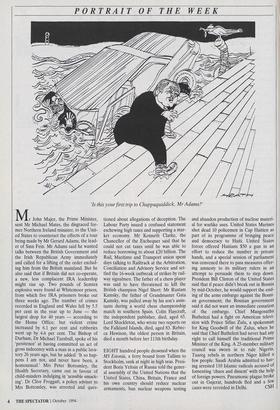PORTRAIT OF THE WEEK
`Is this your first trip to Chappaquiddick, Mr Adams?'
Mr John Major, the Prime Minister, sent Mr Michael Mates, the disgraced for- mer Northern Ireland minister, to the Unit- ed States to counteract the effects of a tour being made by Mr Gerard Adams, the lead- er of Sinn Fein. Mr Adams said he wanted talks between the British Government and the Irish Republican Army immediately and called for a lifting of the order exclud- ing him from the British mainland. But he also said that if Britain did not co-operate, a new, less complacent IRA leadership might rise up. Two pounds of Semtex explosive were found at Whitemoor prison, from which five IRA prisoners broke out three weeks ago. The number of crimes recorded in England and Wales fell by 5.5 per cent in the year up to June — the largest drop for 40 years — according to the Home Office; but violent crime increased by 6.1 per cent and robberies went up by 4.6 per cent, The Bishop of Durham, Dr Michael Turnbull, spoke of his `penitence' at having committed an act of gross indecency with a man in a public lava- tory 26 years ago, but he added: 'It so hap- pens I am not, and never have been, a homosexual.' Mrs Peter Bottomley, the Health Secretary, came out in favour of child-minders indulging in 'sensible smack- ing'. Dr Clive Froggatt, a policy adviser to Mrs Bottomley, was arrested and ques- tioned about allegations of deception. The Labour Party issued a confused statement eschewing high taxes and supporting a mar- ket economy. Mr Kenneth Clarke, the Chancellor of the Exchequer said that he could not cut taxes until he was able to reduce borrowing to about £20 billion. The Rail, Maritime and Transport union spent days talking to Railtrack at the Arbitration, Conciliation and Advisory Service and set- tled the 16-week outbreak of strikes by rail- way signalmen. The father of a chess player was said to have threatened to kill the British champion Nigel Short: Mr Rustam Kamsky, the father of Grandmaster Gata Kamsky, was pulled away by his son's assis- tants during a world chess championship match in southern Spain. Colin Haycraft, the independent publisher, died, aged 65. Lord Shackleton, who wrote two reports on the Falkland Islands, died, aged 83. Rebec- ca Hewison, the oldest person in Britain, died a month before her 113th birthday.
EIGHT hundred people drowned when the MS Estonia, a ferry bound from Tallinn to Stockholm, sank at night in high seas. Presi- dent Boris Yeltsin of Russia told the gener- al assembly of the United Nations that the United States, China, Britain, France and his own country should reduce nuclear armaments, ban nuclear weapons testing and abandon production of nuclear materi- al for warlike uses. United States Marines shot dead 10 policemen in Cap Haitien as part of its programme of bringing peace and democracy to Haiti. United States forces offered Haitians $50 a gun in an effort to reduce the number in private hands, and a special session of parliament was convened there to pass measures offer- ing amnesty to its military rulers in an attempt to persuade them to step down. President Bill Clinton of the United States said that if peace didn't break out in Bosnia by mid-October, he would support the end- ing of the arms embargo against the Bosni- an government; the Bosnian government said it did not want an immediate cessation of the embargo. Chief Mangosuthu Buthelezi had a fight on American televi- sion with Prince Sifiso Zulu, a spokesman for King Goodwill of the Zulus, when he said that Chief Buthelezi had never had any right to call himself the traditional Prime Minister of the King. A 25-member military council was sworn in to rule Nigeria. Tuareg rebels in northern Niger killed a few people. Saudi Arabia admitted to hav- ing arrested 110 Islamic radicals accused of fomenting 'chaos and dissent' with the help of foreign powers. Pneumonic plague broke out in Gujerat, hundreds fled and a few cases were recorded in Delhi. CSH


























































 Previous page
Previous page